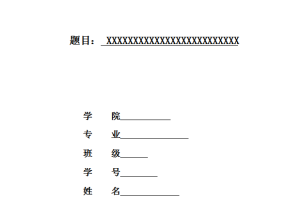Abstract
This paper is a contrastive study of refusal strategies mainly between English and Chinese, which involves the cross-cultural study of English and Chinese as well as cross-register study from interpersonal communications to shopping activities.
The paper has been based on the following two basic hypotheses: (1) The Chinese culture is generally believed to be collectively oriented while the American individually oriented. The two societies are different and therefore it is hypothesized that the discourse realization patterns of refusal strategies might vary from one country to another, although the role and nature of the speech act of refusing might be universally similar. (2) Registers are language varieties appropriate for use in particular speech situations, which are concerned with the addresser’s and the addressee’s relationships to the discourse field, mode and tenor. Since the register of shopping activities is different from that of interpersonal communications, it is hypothesized that the discourse realization patterns of refusal strategies might vary from one register to another.
The paper has been divided into four chapters. Chapter one serves as a general review of the theory of contrastive study and the findings of contrastive study of refusal strategies in interpersonal communications drawn by the scholars both at home and abroad. It is hoped that this review provides the background for the contrastive analysis of refusal strategies in shopping activities. Chapter two focuses on the relevant cross-cultural-register analysis after presenting the goals, the subjects, the designing of questionnaires and the methods for data collection in shopping activities. Chapter three is to take into consideration the theoretical discussion of refusal perception, production, interpretation and reducibility. Chapter four summarizes the key points of the whole paper.
The findings drawn from interpersonal communications indicate that the Chinese tend to use the politeness refusal strategy of “marginally touching the point” because they are more economical in their choices of the number of the tokens of the refusal strategies so that they could restore relationship with people. One polite mode of refusing is “address term + apology + reasons”. The Americans tend to use a “question attentiveness” strategy. They try to employ different refusal strategies in order that the problems in question could be solved. One polite mode of refusing is “ I would like to + reasons + apology”.
The findings also indicate that cooperation and politeness are what people in both cultures are concerned about, because to satisfy others’ faces is to save your own face. However, none of the social situations is completely cooperative, and social situations, in essence, involve some degree of tension between cooperation and antagonism. The register of shopping activities is different from that of interpersonal communications. In the former, people seem to care more about the interests of earning or losing brought about by the goods-money exchanges than the public faces. They usually do not tend to sacrifice their interests to satisfy others’ faces, so they are more economical of and direct in making refusals to others. The study shows that in shopping activities the Chinese tend to employ the mode of “prefaces + phony approval + reasons”, while the Americans would like to use the mode of “prefaces / no + thanks + reasons”. Moreover, the Chinese tend to use the objective reasons such as goods-oriented or attendants-oriented reasons, while the Americans the subjective reasons such as customers-oriented reasons.
This paper might be of some help to further the theoretical researches in literature in the speech act of refusing, as well as to test the refusal hypotheses drawn from interpersonal communications in shopping activities. The originality of this paper lies in its cross-register study of interpersonal communications and shopping activities, besides the cross-cultural study of English and Chinese. It is a pity that the subjects have not included as many individual varieties as possible and it is also hoped that this contrastive study of refusal strategies in shopping activities can be furthered in other languages besides English and Chinese.
Key words: contrastive study, interpersonal communications, shopping activities,
refusing, strategy, speech act.
摘 要
本论文对英汉拒绝言语语用策略进行了对比研究,文中不仅涉及英汉语言文化对比,也涉及跨语域对比,即私人交往拒绝言语与商业购物拒绝言语的对比。
本文语用对比研究以以下两个假设为前提:一、尽管拒绝言语所实施的“拒绝”作用和“拒绝”功能是相似的,由于中美语言文化存在差异,如中国人注重集体,美国人看中个体,因而拒绝言语策略话语实现形式应呈现语言文化差异。 二、语域是适应一定交际情景的语言变体。语域变体与交际双方所涉及的特定交际场合、交际模式、交际意图等因素密切相关。商业购物活动不同于私人交往,因此拒绝言语策略话语实现形式应呈现语域差异。
全文共分四章。第一章介绍了对比研究理论的历史及发展,并对国内外主要学者在私人交往中总结出的英汉(日)拒绝策略进行概述,为本论文商业购物英汉拒绝言语对比研究奠定基础。第二章讨论了商业购物拒绝言语策略对比研究项目的目标、调查对象、问卷调查设计及数据的采集和分析,并重点进行跨文化、跨语域的相关对比分析。第三章从总体上对拒绝言语行为的感知、生产、阐釋和归属进行理论探讨。第四章对论文中心要点进行了总结。
拒绝言语的对比研究目前大多局限在私人交往语域中,国内外学者认为中国人拒绝时使用的拒绝策略比较节省,采用“点到为止”策略,以维护人际关系。采用的一般模式是称呼语加道歉语加拒绝理由。美国人则使用“问题关注”策略,可以自由地使用多种策略,重在解决问题。他们常以表示“愿意”的虚拟式开头,然后说明拒绝理由,最后表示道歉。
拒绝言语研究表明:人们在社会交往中为维护自身的公共面子,一般是愿意遵循合作原则和礼貌原则,因为照顾别人的面子就是给自己面子。但在实质上,社会交往涉及合作和对抗间的一种动态磨合。商业购物活动不同于私人交往,人们对“钱物交换”所带来的“惠”、“损”利益更加关注,因此在拒绝言语策略的话语表现上会更节省更直接,一般不会牺牲自己的钱物来照顾别人的面子。中国人习惯使用“暗示语 + 假赞同 + 拒绝理由”模式,而美国人则用 “(暗示语)不 + 谢谢 + 拒绝理由”; 中国人更多使用以商品、售货员为中心的客观理由,而美国人则更多表达顾客自己不满意的主观理由。
本论文研究有助于深化和丰富目前拒绝言语对比研究的理论及其逻辑实证调查。它的创新之处在于该论文不仅对前人在私人交往中总结出的拒绝假设在商业购物活动中进行跨语言文化论证,而且对私人交往和商业购物中的拒绝言语进行跨语域对比,总结了商业购物活动中中美惯用的拒绝模式及其策略。该论文的不足之处在于中英测试对象不可能囊括方方面面的个体,中英商业拒绝言语总结出的拒绝模式及其策略还有待于在英汉等其它语言中得到进一步的调查和探索。
关键字:对比研究、私人交往、商业购物、拒绝、策略、言语行为。





